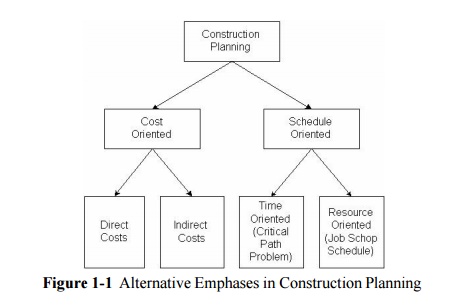Chapter: Civil : Construction Planning And Scheduling
Basic Concepts in the Development of Construction Plans

Basic concepts in the development of construction
plans-choice of Technology and Construction method-Defining Work Tasks-
Definition- Precedence relationships among activities-Estimating Activity
Durations-Estimating Resource Requirements for work activities-coding systems.
Basic Concepts in the Development of Construction
Plans
Construction planning is a fundamental and
challenging activity in the management and execution of construction projects.
It involves the choice of technology, the definition of work tasks, the
estimation of the required resources and durations for individual tasks, and
the identification of any interactions among the different work tasks. A good
construction plan is the basis for developing the budget and the schedule for
work. Developing the construction plan is a critical task in the management of
construction, even if the plan is not written or otherwise formally recorded.
In addition to these technical aspects of construction planning, it may also be
necessary to make organizational decisions about the relationships between
project participants and even which organizations to include in a project. For
example, the extent to which sub-contractors will be used on a project is often
determined during construction planning.
Forming a
construction plan is a highly challenging task. As Sherlock Holmes noted:
Most people, if you describe a train of events to
them, will tell you what the result would be. They can put those events
together in their minds, and argue from them that something will come to pass.
There are few people, however, who, if you told them a result, would be able to
evolve from their own inner consciousness what the steps were which led up to
that result. This power is what I mean when I talk of reasoning backward.
Like a detective, a planner begins with a result
(i.e. a facility design) and must synthesize the steps required to yield this
result. Essential aspects of construction planning include the generation of
required activities, analysis of the implications of these activities, and
choice among the various alternative means of performing activities. In
contrast to a detective discovering a single train of events, however,
construction planners also face the normative problem of choosing the best
among numerous alternative plans. Moreover, a detective is faced with an
observable result, whereas a planner must imagine the final facility as
described in the plans and specifications.
In developing a construction plan, it is common to
adopt a primary emphasis on either cost control or on schedule control as
illustrated in Fig. 9-1. Some projects are primarily divided into expense
categories with associated costs. In these cases, construction planning is cost
or expense oriented. Within the categories of expenditure, a distinction is
made between costs incurred directly in the performance of an activity and
indirectly for the accomplishment of the project. For example, borrowing
expenses for project financing and overhead items are commonly treated as
indirect costs. For other projects, scheduling of work activities over time is
critical and is emphasized in the planning process. In this case, the planner
insures that the proper precedences among activities are maintained and that
efficient scheduling of the available resources prevails. Traditional
scheduling procedures emphasize the maintenance of task precedences (resulting
in critical path scheduling procedures) or efficient use of resources over time
(resulting in job shop scheduling procedures). Finally, most complex projects
require consideration of both cost and scheduling over time, so that planning,
monitoring and record keeping must consider both dimensions. In these cases,
the integration of schedule and budget information is a major concern.
In this chapter, we shall consider the functional
requirements for construction planning such as technology choice, work
breakdown, and budgeting. Construction planning is not an activity which is
restricted to the period after the award of a contract for construction. It
should be an essential activity during the facility design. Also, if problems
arise during construction, re-planning is required.
Related Topics